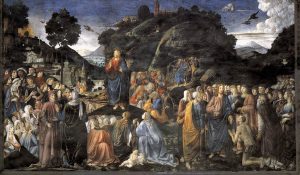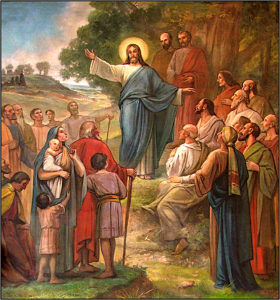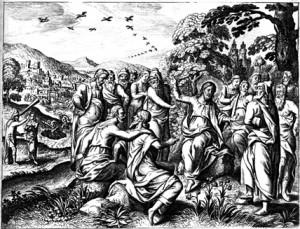Illuminations on the Lectionary readings for Jan. 29, 2023 (Epiphany 4A)
First Reading: Micah 6:1-8
How are we called to walk in God’s way, and what does that look like? Listen for wisdom on this question through Sunday’s Lectionary readings, culminating in the Beatitudes in Jesus’ Sermon on the Mount.

Sermone della Montagna (Sermon on the Mount, 1481-1482), Fresco by Cosimo Rosselli (1439-1507), Sistine Chapel, Vatican City, Rome. (Click image to enlarge)
In our first reading we hear the prophet Micah, who prophesied to the people of Judea and Samaria as they faxed an existential threat from Babylonia. Micah imagines all humanity standing before God like a defendant in a trial, pleading our case before the almighty Judge. God “has a controversy with us,” the prophet warns, reminding the people that God has done so much for them since bringing them out of Egypt to the promised land. How are the people to respond? Not with burnt offering or sacrifice, but, in Micah’s memorable words, simply by doing justice, loving kindness and walking humbly with God.
Psalm: Psalm 15
Who among us can claim the high honor of living in God’s sanctuary? The Psalmist’s instructions bear a marked resemblance to Micah’s prophecy: Those who do right, speak truth, don’t slander or reproach and do no evil, comes the reply. Those may dwell in God’s tabernacle and abide on God’s holy hill. Honesty, kindness, and love of neighbor all make a difference. The way we live matters.
Second Reading: 1 Corinthians 1:18-31
Paul, continuing his lecture to the quarreling factions in the church at Corinth, repeats the verse that concluded last Sunday’s reading: Jesus’ death on the cross – a horrific form of execution reserved by Rome for the worst criminals – “is foolishness to those who are perishing, but to us who are being saved it is the power of God.” Yet, Paul goes on, God chose this way to celebrate the weak, the poor and the despised and to shame the powerful and the strong. This comes to us through Jesus, who gives us wisdom, righteousness, sanctification and redemption.
Gospel: Matthew 5:1-12
Ah, the Beatitudes! Jesus’ loving verses in the Sermon on the Mount are central to Christian thinking, so much so that it is easy to hear them with more affection than deep reflection. But beatitudes – a Scriptural genre found also in Psalms and Proverbs – reward deeper thought. In eight quick phrases, Jesus turns the world upside down: The poor are blessed, not the rich. Mourners, the meek, the hungry; the merciful, the pure in heart, the peacemakers, the oppressed win God’s blessing. This should come as no surprise to those who follow Jesus and remember the words of his mother’s song: “He has cast down the mighty from their thrones, and has lifted up the lowly. He has filled the hungry with good things, and the rich he has sent away empty.”


